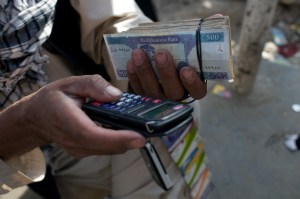 Afghanistan supplies 92% of the world’s opiates. According to the latest available figures, the country produced 8,200 tons of heroin in 2008, more than double the the amount three years earlier.
Afghanistan supplies 92% of the world’s opiates. According to the latest available figures, the country produced 8,200 tons of heroin in 2008, more than double the the amount three years earlier.
But even being the heroin capital of the world, bringing in more money than most Afghans can dream of, the on-going war and rampant corruption means the money goes to the wrong people and the country has no infrastructure. There are no decent roads, no railways… But they do have mobile phones.
Four months ago, the Afghan National Police began to pay salaries through mobiles (using a text and Interactive Voice Response system), rather than in cash. The platform used was based on the M-Pesa service that has become highly successful in Kenya. Branded M-Paisa in Afghanistan, it was introduced by the operator Roshan in partnership with the Ministry of the Interior (MOI) and had an immediate effect.
On receiving their money in this way for the first time, most Afghan policemen assumed that they had been given a salary increase: in fact they had simply received their full pay for the first time. In some cases they received pay ‘rises’ of more than a third, preventing defections to the Taliban who were previously able to pay higher ‘salaries’.
But there were initial problems. One of the higher-ranked Afghan commanders was so angry (and dumb) about losing his cut that he took all the SIM cards from his underlings and tried to collect the money himself. Eventually a Roshan employee reported the abuse to the MOI and the commander was prevented from doing so again… even if he wasn’t prosecuted.
The Afghan Police are not the only people to be paid this way. All of Roshan’s employees are paid by M-Paisa and consequently Afghanistan’s economy is beginning to benefit as the currency seeps through to the correct people and not the corrupt middlemen. Local stores have effectively become banks and the finances of Afghans who used to carry cash around the country are infinitely more secure.
The service facilitates the transfer of funds through SMS and an Interactive Voice Response (IVR) system. The IVR-based menu is available to customers in Dari, Pashto and English; important in Afghanistan where 70% of the population is illiterate. M-Paisa is powered by Roshan’s mobile network that spans across 230 cities and towns in all of Afghanistan’s 34 provinces.
This arrangement with Roshan and the MOI guarantees payments and is backed up by a grant from the Bill & Melinda Gates Foundation who gave trade association the GSMA a $12.5 million grant to provide mobile banking facilities to 20 million people around the world by 2012.
Seema Desai, Director of Mobile Money for the Unbanked for the GSMA is unequivocal in what Afghanistan represents for the programme. “If we can make it work in this country, then we can make it work anywhere”, she says.
Karim Khoja is the CEO of Roshan and has plans to roll out the scheme to more Afghanistan businesses and even claims that M-Paisa reduces the number of soldiers going AWOL, but is chary when asked if the country’s army will be paid by M-Paisa.
“’Currently, discussions are underway with the Government of Afghanistan to examine how M-Paisa can best serve their needs and reduce the need for cash in the field, while also serving as a tool to support financial inclusion,” he says.
In a country where 36% of its people live below the poverty line, Afghanistan is the poorest country in the world outside Africa, but it also has a 40% penetration rate of 12 million mobile subscribers out of a population of 30 million.
While it’s unlikely that Afghanistan will produce less heroin in the near future, it is certain that schemes like this are going to grow as mobile penetration increases and offers a shot in the arm to the people, not from a needle, but from a mobile phone.
I hope to see it for myself after being offered a tentative invitation to visit the country in early December. I’m looking forward to it. The mobile banking story that is, not the heroin.
…
Monty Munford has more than 15 years’ experience in mobile, digital media, web and journalism and returned to the UK in September, 2010 after living in India for two years. In that time he consulted clients such as Paramount Digital Entertainment in LA and Liverpool FC to deliver their content to an Indian mobile audience, spoke at events in London, Dublin and Singapore and landed two speaking parts in two big-budget Bollywood movies that will be released in December 2010.